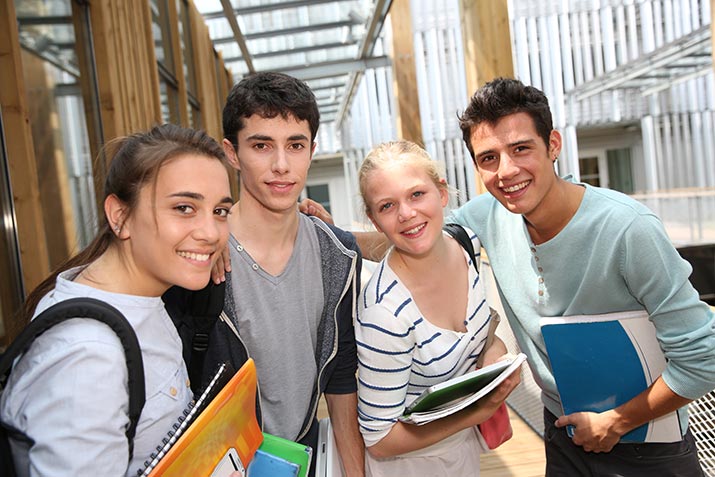THE BASQUE EDUCATION SYSTEM
1. Infant, primary and compulsory secondary education

In the Autonomous Community of the Basque Country there is free schooling available from 3 to 16 years old and education is compulsory from 6 years old. It consists of:
- Infant Education: from 3 to 6 years old
- Primary Education: from 6 to 12 years old
- Compulsory Secondary Education (ESO): from 12 to 16 years old
Types of school
There are state schools, “concertado” schools (private education subsidised by the Department of Education, Universities and Research at the Basque Government) and international schools.
Apart from the international schools in the Basque Country, teaching is in two languages: Basque and Spanish. These are the two official languages in this Community.
List of non-university education centres (schools and institutes in the Basque Country)
The Basque Country has five international schools:

Bizkaia:
- American School of Bilbao
- Deutsche Schule Bilbao
- Lycée Français de Bilbao
- ST George’s English School
Gipuzkoa:
Further information:
2. Post-Compulsory Secondary Education

Students can choose whether or not to stay on at school from 16 to 18 years old.
Students who pass the Compulsory Secondary Education qualification obtain the “Graduate of Compulsory Secondary Education” qualification which allows them to study for a High School Diploma (bachillerato) or intermediate vocational training (ciclos formativos de grado medio).
High School Diploma (Bachillerato)
- Optional Education.
- Access requires the Graduate of Secondary Education qualification.
- There are four different types: Arts; Nature and Health Sciences; Technology; and Humanities and Social Sciences, in addition to the High School Diploma in Music and Dance.
- The courses last for two academic years.
At the end of the course pupils obtain their High School Diploma which gives them access to post-secondary training: University and Higher Education (Vocational Training).
Intermediate Specific Vocational Training
- Optional Education.
- Post-secondary education:
- Basic Professional (and allows you to study a medium-level training cycle)
- Technical (and allows you to take higher-level training cycles)
- Superior Technician – Duration of 2000 hours (except for some residual exceptions of 1400 and 1700 hours) in two academic years.
3. University Education

The Basque university system is part of the European Higher Education Area, also known as the Bologna process. The Bologna Plan is based on a flexible system of easily readable and comparable degrees, in order to promote the employment opportunities for students and encourage their mobility, while also aiding the international competitiveness of the European Higher Education System. The qualifications which can be obtained are:
- Approved qualifications: Officially valid across Spain.
- Own qualifications: only recognised by the universities providing those courses.
System of university qualifications:
This is based on Graduate and Post-Graduate, which together are structured into three cycles:
- First Cycle or Graduate: basic teaching and general training aimed at preparing students for professional activities. Passing this Cycle will give the student the right to obtain the corresponding qualification in accordance with that agreed by the Government.
- Second Cycle or Post-graduate: advanced education, of a specialist or multi-disciplinary nature, designed for an academic or professional specialisation or to begin research activities. Passing this Cycle will give the student the right to the Master’s qualification.
- Third Cycle: advanced training in the techniques for creating and presenting a PhD thesis. Passing this Cycle will give the student the right to obtain the Doctoral qualification (the highest academic qualification in higher education and one which prepares the student for teaching and research)
For further information:

University of the Basque Country – Euskal Herriko Unibertsitatea
The state university system in the Basque Country consists of the official University centres in the three historical territories (Araba, Bizkaia and Gipuzkoa) and a significant group of University Schools that have been created as affiliated centres.
Useful information:
- Vice Deanship for Research. This offers services and information for the university community in relation to the world of science and research.
- Vice Deanship for Basque, Culture and Internationalisation.
- Transfer and Innovation OTRI.

University of Deusto
The University of Deusto is currently spread across two different campuses in the two coastal capitals of the Basque Country: Bilbao and Donostia-San Sebastian, and headquarters in Vitoria-Gasteiz and Madrid.
Useful information:
- International.
- Investigation has seen a significant growth during the last decades, following a path towards excellence through the increased participation in international projects and networks.
- DeustoAlumni: DeustoAlumni, facilitated by the Community of Alumni of the University of Deusto, provides alumni all over the world with a space for meeting and dialogue.

University of Mondragon
Mondragon Unibertsitatea is a young university with close ties to the business world, which benefits all its students.
It currently has two Faculties and a School:
- Higher Polytechnic School
- Faculty of Business Sciences
- Faculty of Humanities and Education Sciences
- Faculty of Gastronomy and Culinary Arts

Uned-Euskadi
The National Distance Education University offers the opportunity to combine the working day with university education.

TECNUN-San Sebastian Higher School of Engineering
Tecnun belongs to the University of Navarra, and its objective is to contribute to the professional and scientific training of the engineers of the future.







